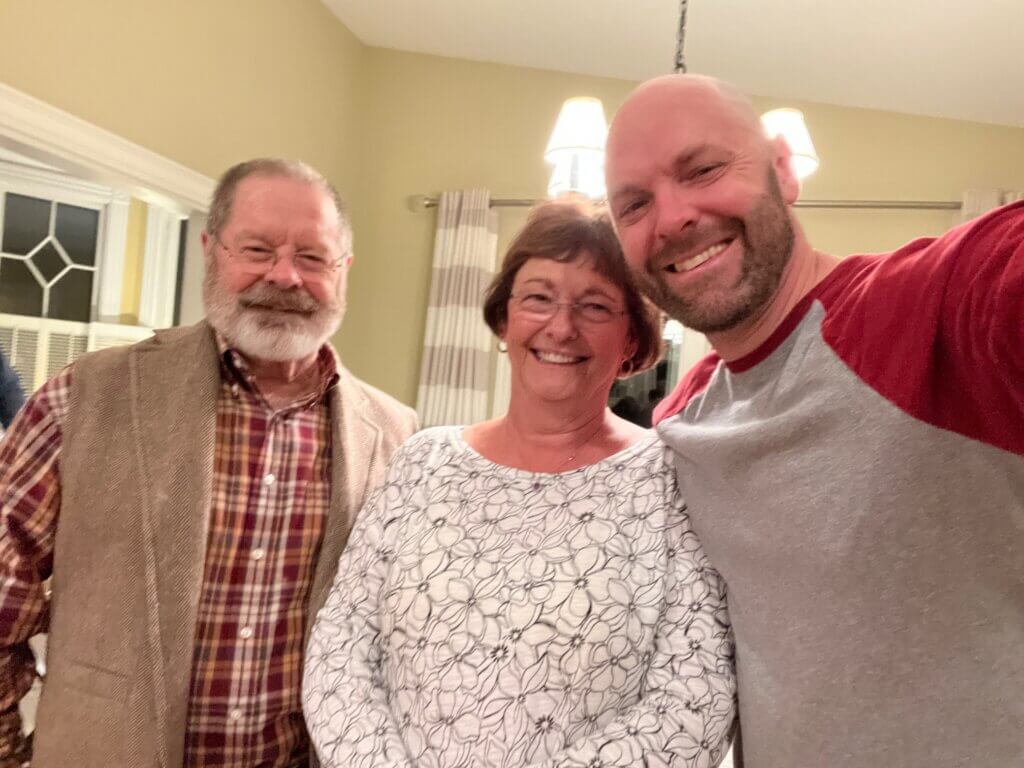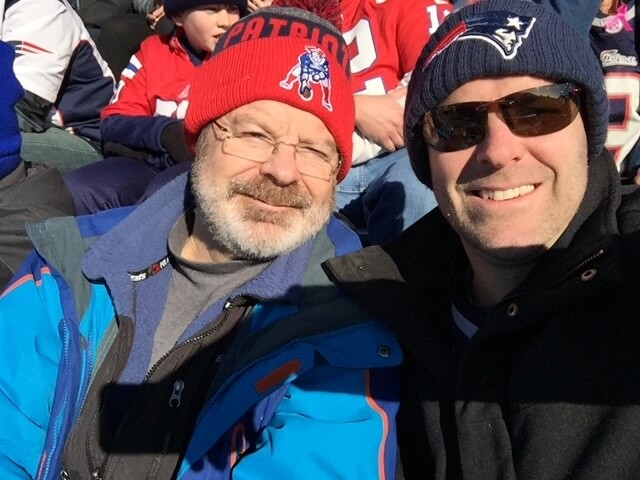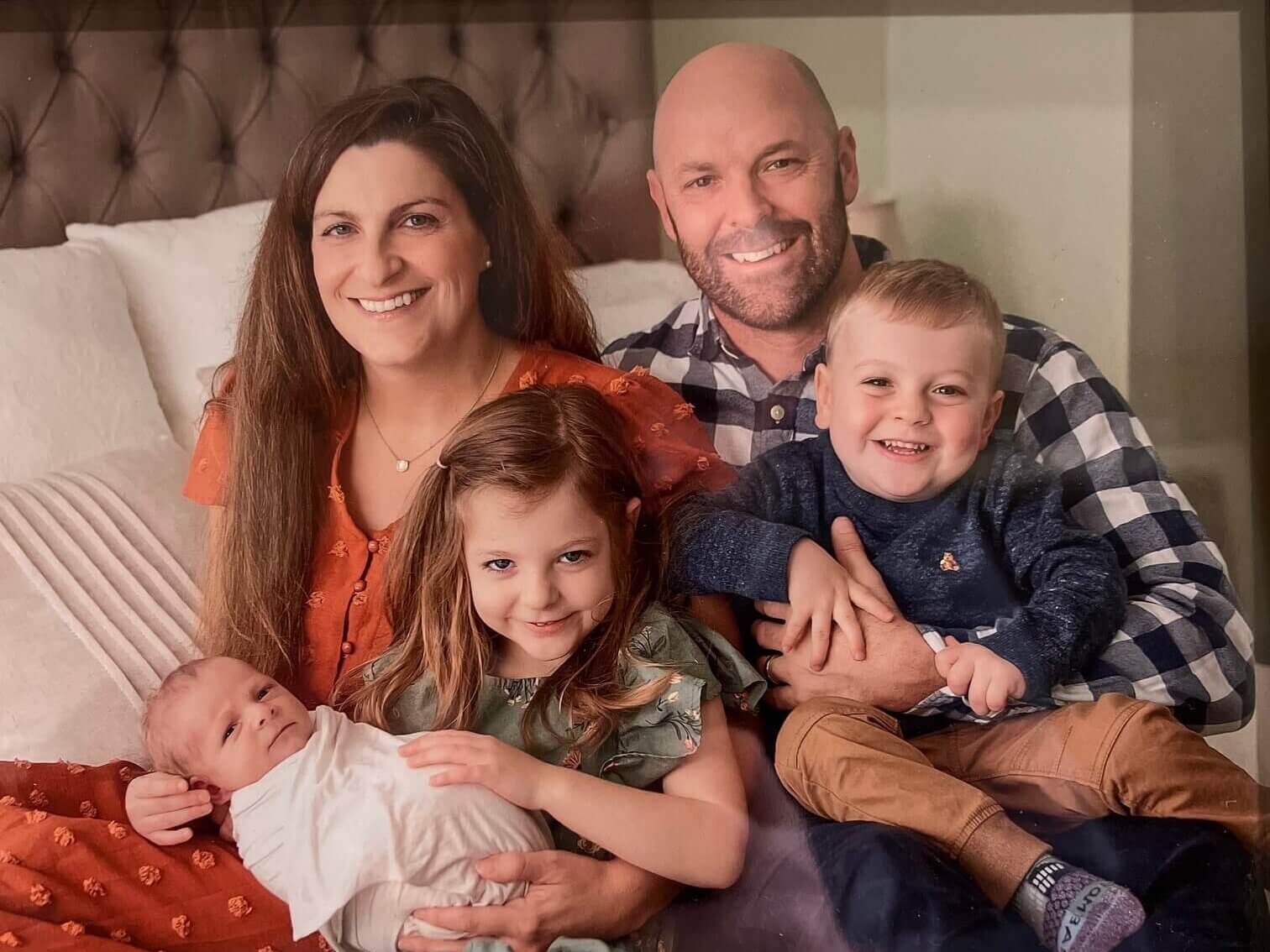The first time Jay Reese was diagnosed with colon cancer, he didn’t tell his preschool-aged children. After it came back decades later, he told them immediately — and then suggested they take action.

Jay underwent genetic testing after his 2012 colon cancer recurrence which revealed he had Lynch syndrome, an inherited genetic condition which carries a mutation that significantly increases a person’s risk for a variety of cancers. Because many Lynch-related cancers are preventable with proper screening, and genetic test results can increase access to screening options, Jay encouraged his wife, Gayle, and their two children to also get tested for the mutation.
When their son Scott did, he learned that he too had Lynch syndrome — which in men carries a heightened risk for colorectal, stomach, pancreatic, urinary tract, and prostate cancer. Now Scott, 39, is seen regularly at the Lynch Syndrome Center at Dana-Farber, which offers personalized, comprehensive care to individuals and families affected by Lynch syndrome while conducting research and identifying new prevention and treatment methods.
A team led by Matthew Yurgelun, MD, director of the Lynch Syndrome Center, screens Scott for signs of any developing cancers and advises him on which additional tests and lifestyle choices can lower his cancer risk. Scott also undergoes a yearly colonoscopy, with the results sent to the Lynch Syndrome Center for evaluation.
“My dad and I have made it an annual ritual,” says Scott. “He drives me to my colonoscopy appointments, and then after I’m done, he treats me to a big breakfast at our favorite diner.”

These father-son trips may lack the excitement of their many past sojourns to New England Patriots football games, but Jay and Scott both know how important they are. Several times during Scott’s colonoscopies, doctors have found and removed suspicious polyps that might have become cancerous if left undetected.
“Of course, we were hoping Scott didn’t have Lynch syndrome, but he’s plugged into the right place to make sure he’s followed as closely as possible,” says Jay, 73. “If anything ever happens, we know it’s going to be caught early.”
Uncovering the cause
Although Lynch syndrome is fairly common, occurring in about 1 in 300 individuals, most people don’t know they have it. This was the case for Jay, who was just 36 in 1987 when abdominal pain, bloody stool, and edema led him to the emergency room. Gayle recalls feeling “blindsided” by the diagnosis of colon cancer — the couple didn’t know yet about Jay’s family history with the disease going back to the 1920s and 30s.
“We had no idea, because my mother had never told us, but we learned that my mother’s father died of colon cancer in his mid-40s,” says Jay. “In addition, he had a number of other male relatives who also died of colon cancer when they were young.”
Since Jay and Gayle’s own kids were then too young to understand his diagnosis, they didn’t discuss it with them. Jay had surgery, six weeks of radiation at Dana-Farber, a year of chemotherapy, and began getting annual colonoscopies. For nearly 25 years, he received only clean scans.
Then came 2012.
“After my colonoscopy that year, the doctor came out with this look on his face,” recalls Jay. “He said ‘I just saw you 12 months ago, and you didn’t have any signs of trouble. Now you’ve got tumors in two different places in your large intestine.’”
Jay had a full colectomy in February 2012, after which his oncologist assured him that he needed no further surgery, radiation, or chemotherapy. Genetic testing, however, could help uncover the cause of his cancer and what risk there might be for the other members of his family.
That was all Jay needed to hear. Genetic testing revealed he had Lynch syndrome, leading to Scott’s own testing — and diagnosis — at the Lynch Syndrome Center later that year. Jay’s daughter’s testing is still pending.
“Lynch syndrome raises the risk for multiple cancers, often at young ages, and can be a potentially devastating syndrome in cases where we are unaware of it,” explains Yurgelun. “That said, this is a perfect example of when ‘knowledge is power.’ For people like Scott who know about the Lynch syndrome diagnosis, there is an incredible array of interventions that can drastically mitigate the chances of ever getting cancer.”
Challenges and celebrations
As they do for all individuals seen in the Lynch Syndrome Center, Yurgelun and his team created a personalized care plan for Scott aimed at preventing Lynch syndrome-related cancers in his future. They can coordinate his care with experts in surgery, gastroenterology, dermatology, and oncology as needed, and Scott is able to review the results of his screening tests, meet with a genetic counselor, and discuss revisions to his plan during his clinic visits. If he sees outside health care providers, these records are sent to his Lynch syndrome team to factor into his care as well.
“Even though I’m at increased risk, I feel very lucky to have these experts in my corner,” says Scott. “I can always reach out to them with questions or concerns.”
An unexpected challenge came in 2019 when Scott was diagnosed with melanoma, not one of the cancers associated with Lynch syndrome. He was successfully treated at Dana-Farber, and skin screenings remain an important part of his annual visits with his Lynch Syndrome Center team.

Far happier developments came when Scott and his wife, Lauren, decided to expand their family. After consultation with Yurgelun, the couple took a step to ensure that the mutation causing Lynch syndrome not be passed down to another generation. Scott and Lauren underwent in vitro fertilization, and harvested only embryos lacking the mutation. Scott and Lauren now have three healthy, non-Lynch-carrying children ranging from one to six years old, which delights grandparents Jay and Gayle — who marked their 50th anniversary in July 2024.
“We are continuing to look at new ways to improve care for those affected by Lynch syndrome so that they can realize the immense power of genetically driven cancer prevention,” says Yurgelun. “As Scott and Lauren have pursued, we now also have the ability to prevent the genetic alteration that causes Lynch syndrome and a specific family from even being passed on to the next generation, effectively stopping this in its tracks.”
